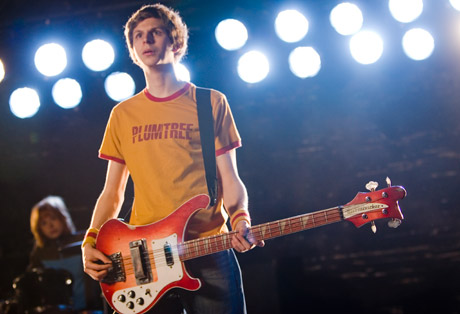After almost a decade of toiling and climbing the charts in their native Australia, the Beautiful Girls (actually a trio with nary an XX chromosome between them) are ready to hit the big time in America. Their strategy is reasonably sound: release the quintessential summer album and make it heavily reliant on reggae beats, trumpets, and gentle surf 'n' sandals rock.
It's a notable departure from the Girls' earlier records, most often labeled roots-rock, but singer-songwriter Mat McHugh feels the shift on the latest disc, Spooks, is organic.
"We all grew up with reggae and punk rock as part of our musical education, and it's been a part of our music since day one," McHugh says. "Being from Australia, where reggae isn't the best way to pay the bills as a musician, we've kept that side of ourselves fairly subtle until now. This time I think we realized we've reached a place where we could start doing whatever we felt like, and this record is the result."
The sound of Spooks might be summery, but the album's inspiration was anything but. McHugh secluded himself in his home for more than a year following the end of his solo tour in 2009, ultimately crafting the songs that would become Spooks, which evokes everything from the rhythmic pulse of the ocean to the opening credits of COPS. Even the song titles, like "My Mind is an Echo Chamber" and "Home/Family," offer revealing glimpses of the man as an artist.
"In my opinion, all the records we made before these have been about finding our feet," McHugh says. "This time around, I just wanted to talk about things I cared about in the way that I wanted to talk about them. I have to be inspired to write lyrics, and, in that sense, every song I write is somewhat cathartic. I'm always getting things off my chest to varying degrees, and I don't see any other way around it. The alternative is just writing down a bunch of words that have no meaning to me, and I honestly wouldn't want to waste my time."
And while certain songs, like the slickly-produced "Rockers!," do little to support the notion of catharsis, other songs ring so genuinely true they become impossible to resist. "B Some Melody" is humble and simple, a sweet ukulele number that tiptoes its way into your heart. But probe too deeply and McHugh's quick to retreat behind his well-crafted wall of words. On his own website, he acknowledges that taking responsibility for his own "fuck-ups" was the inspiration behind the album's sole ballad, "My Latest Mistake," but he's not eager to elaborate during our interview.
"I think every single human being on earth is a constant fuck-up," McHugh says. "Contrary to some people's opinion, nobody is perfect. I think the song is about realizing that fact and finding out a way to move forward. I have absolutely no intention of sharing with you my biggest mistakes. I'm a real person with real relationships in my life, and I value them too much to trivialize them. Besides, everybody has their own mistakes to deal with."
McHugh seems ready to put whatever mistakes he's made behind him and focus on the Beautiful Girls' future. He admits that the last decade's been "a long, slow climb," but stands behind the band's decision to start independent and stay that way.
"Sometimes it's difficult, and we've come up against obstacles, but I think that is to be expected when we have to compete against big labels and their large marketing budgets," McHugh says. "I think that having a deep love for music and an in-built outsider mentality have kept us motivated to take the big corporations on at their own game. We've always relied on the connection we make with people and the word of mouth that comes from it. No amount of money can buy that. We're super lucky."
This North American tour will be the first time the band's had the chance to play the exact same show they would in Australia, with five members taking the stage every night, including a keyboardist and a DJ. Though McHugh's confident that this will be the tour where his band really breaks out, he also knows that even if that doesn't happen, it will be easy to stay motivated.
"I think we all just consider ourselves musicians, and what we want to do with our lives is play and contribute music," McHugh says. "In that spirit, I believe we'll just keep doing what we do, more records and more touring. We're especially committed to spending a lot of time in America and growing our band over there. I think America and the Beautiful Girls are in the early stages of a beautiful, blossoming love affair."
Now the only question is, will America reciprocate?









